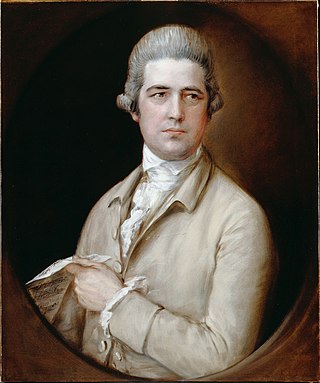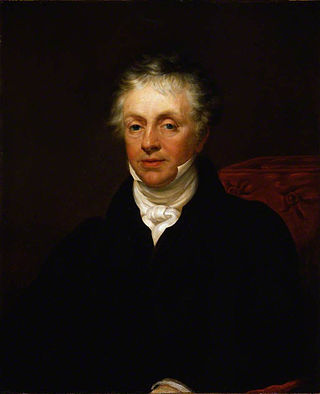
John Liptrot Hatton was an English musical composer, conductor, pianist, accompanist and singer.

Thomas Linley was an English bass and musician active in Bath, Somerset. Born in Badminton, Gloucestershire, Linley began his musical career after he moved to Bath at age 11 and became apprentice to the organist Thomas Chilcot. After his marriage to Mary Johnson in 1752, Linley at first supported his wife and growing family predominantly as a music teacher. As his children grew and he developed their musical talent, he drew an increasing amount of income from their concerts while also managing the assembly rooms in Bath. When the new Bath Assembly Rooms opened in 1771, Linley became musical director and continued to promote his children's careers. He was eventually able to move to London with the thousands of pounds which he had amassed from their concerts.
A glee is a type of English part song composed during the Late Baroque, Classical, and early Romantic periods. The respectable and artistic character of glees contrasts with the bawdiness of the many catches which continued to be composed and sung well into the early years of the 19th century.

Thomas Attwood was an English composer and organist. Attwood studied under Mozart and he was friendly with Felix Mendelssohn.

The Royal Philharmonic Society (RPS) is a British music society, formed in 1813. Its original purpose was to promote performances of instrumental music in London. Many composers and performers have taken part in its concerts. It is now a membership society, and while it no longer has its own orchestra, it continues a wide-ranging programme of activities which focus on composers and young musicians and aim to engage audiences so that future generations will enjoy a rich and vibrant musical life. Since 1989, the RPS has promoted the annual Royal Philharmonic Society Music Awards for live music-making in the United Kingdom.

Randall Thompson was an American composer, particularly noted for his choral works.
On two occasions, Felix Mendelssohn composed music for William Shakespeare's play A Midsummer Night's Dream. First in 1826, near the start of his career, he wrote a concert overture. Later, in 1842, five years before his death, he wrote incidental music for a production of the play, into which he incorporated the existing overture. The incidental music includes the famous "Wedding March".
A part song, part-song or partsong is a form of choral music that consists of a song to a secular or non-liturgical sacred text, written or arranged for several vocal parts. Part songs are commonly sung by an SATB choir, but sometimes for an all-male or all-female ensemble. Part songs are intended to be sung a cappella, that is without accompaniment, unless an instrumental accompaniment is particularly specified.

Thomas Linley the younger, also known as Thomas Linley, Junior or Tom Linley, was the eldest son of the composer Thomas Linley and his wife Mary Johnson. He was one of the most precocious composers and performers that have been known in England. A highly talented violinist, Tom Linley was also the most promising of all native English composers between Henry Purcell and Edward Elgar, combining prodigious talent with a delightful personality. He is sometimes referred to as the "English Mozart". His early promise was cut short when he drowned in a boating accident, aged just 22 years.
Jakob Zeugheer, was a Swiss violinist, conductor and composer.
Thomas Shaw, also known as Thomas Shaw Jun(ior, was an English violinist, violist, clarinettist and composer who was born c.1752, probably in Bath, and who probably died in Paris on 28 June 1827 or c.1830. Thomas Shaw was the son of Bathonian musician Thomas Shaw and the younger brother of violinist Anthony Shaw. The majority of his career was spent at the Drury Lane theatre in London as an instrumentalist, violin soloist, band leader, musical director and in-house composer.

The Argyll Rooms was an entertainment venue on Little Argyll Street, Regent Street, London, England, opened in 1806. It was rebuilt in 1818 due to the design of Regent Street. It burned down in 1830, but was rebuilt, but later mainly occupied by shops. It was the home of the Philharmonic Society of London from its inception in 1813 until 1830. Spohr, Moscheles, Liszt and Mendelssohn made their first appearances in England at the rooms.
The Bach Society was a musical organization in London from 1849 to 1870. Its primary goals, as stated in its prospectus, were (1) to collect the works of Johann Sebastian Bach, both printed and in manuscript, and all works related to him, his family, or his music; and (2) the furtherance and promotion of a general acquaintance with his music by its public performance.
The "Vocal Concerts" were subscription concerts in London, given from 1792 to 1794 and from 1801 to 1821. Leading singers of the day performed at the concerts.
The British Orchestral Society was established in 1872 for the purpose of giving an annual series of concerts by British artists. The Society ceased to exist in 1875, its last concert taking place on 1 June of that year.
James Brooks was an English violinist and composer who was born in Bath c. 1760 and died in London in December 1809.
The Society of British Musicians was a Society founded in 1834, dedicated to promoting the composition and performance of British music. It gave concerts of works by leading British composers of the day. The Society was dissolved in 1865.
Regent's Harmonic Institution (RHI), also known as Royal Harmonic Institution, Welsh and Hawes at the Royal Harmonic Institution, and Welsh and Hawes, was a 19th-century English firm of music publishers as a well as a purveyor of music instruments. The firm was notably the first press to publish Ludwig van Beethoven's Hammerklavier in an edition authorized by the composer in September 1819.
George Eugene Griffin was an English pianist and composer.
The Societa Armonica, founded about 1827, gave subscription concerts in London, England.







